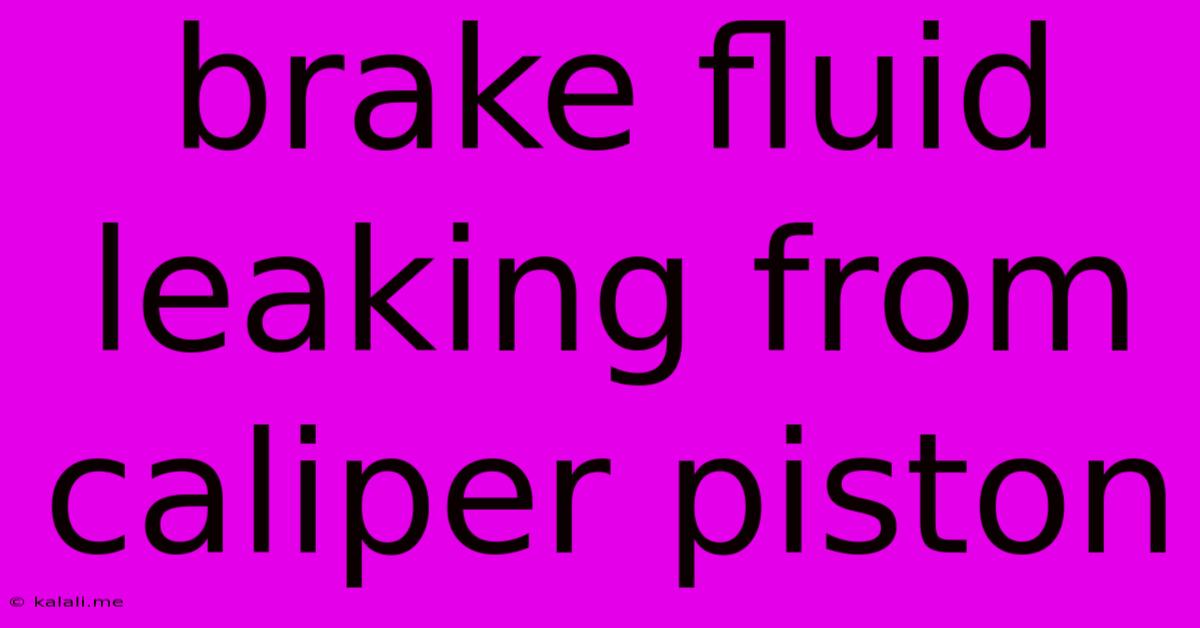Brake Fluid Leaking From Caliper Piston
Kalali
Jun 06, 2025 · 3 min read

Table of Contents
Brake Fluid Leaking From Caliper Piston: Diagnosis and Repair
Meta Description: Experiencing brake fluid leaking from your caliper piston? This comprehensive guide explains the causes, diagnosis, and repair process, helping you restore your braking system's safety and efficiency. Learn about common problems, troubleshooting steps, and when to seek professional help.
Brake fluid leaking from a caliper piston is a serious issue that demands immediate attention. A compromised braking system significantly impacts your vehicle's safety and can lead to complete brake failure. This article will guide you through understanding the causes of this leak, diagnosing the problem, and outlining potential repair solutions. Remember, safety is paramount; if you're uncomfortable performing these repairs yourself, seek professional help from a qualified mechanic.
Common Causes of Brake Fluid Leaks from Caliper Pistons
Several factors can contribute to brake fluid leaking from a caliper piston. Identifying the root cause is crucial for effective repair. Here are some of the most common culprits:
-
Damaged or Worn Seals: The most frequent culprit is a damaged or worn-out piston seal. These seals prevent brake fluid from escaping the caliper. Over time, they can deteriorate due to age, heat, or contamination from road debris. This leads to visible brake fluid leakage around the piston.
-
Damaged or Corroded Piston: Corrosion, often caused by moisture and exposure to the elements, can damage the piston itself. Scratches or pitting on the piston surface can compromise the seal's ability to maintain a proper seal, resulting in leaks.
-
Caliper Housing Issues: Cracks or damage to the caliper housing itself can also allow brake fluid to escape. This is less common than seal or piston damage but should be thoroughly investigated if other causes are ruled out.
-
Low-Quality Brake Fluid: Using low-quality or contaminated brake fluid can accelerate seal and piston deterioration. Always use the recommended brake fluid specified by your vehicle manufacturer.
-
Improper Bleed Procedure: A poorly executed brake bleeding procedure can introduce air into the braking system, causing pressure fluctuations and potentially forcing fluid past seals.
Diagnosing the Leak
Before attempting any repairs, you need to accurately pinpoint the source of the leak. Here's how to diagnose a brake fluid leak from a caliper piston:
-
Visual Inspection: Carefully examine the caliper for any visible signs of brake fluid leakage. Look closely around the piston boot and the caliper housing for wetness or staining.
-
Brake Fluid Level Check: Check the brake fluid reservoir. A consistently low level suggests a leak somewhere in the braking system.
-
Pressure Test (Optional): A pressure test, performed by a mechanic, can precisely locate the point of the leak within the braking system.
-
Wheel Removal: To thoroughly examine the caliper, you may need to remove the wheel. This allows for a clearer view of the caliper and piston area.
Repairing a Leaking Caliper Piston
Repairing a leaking caliper piston typically involves replacing the damaged components. This is a moderately challenging task requiring some mechanical skills and the right tools.
-
Caliper Removal: Safely remove the caliper from the brake assembly.
-
Seal Replacement: Replace the damaged piston seals with new ones. It's crucial to use seals specifically designed for your vehicle's caliper.
-
Piston Inspection and Replacement (If Necessary): If the piston is damaged, replace it as well. A corroded or pitted piston will likely continue to leak even with new seals.
-
Caliper Reassembly and Bleed: Carefully reassemble the caliper, ensuring the new seals are correctly installed. After reinstallation, the brake system needs to be properly bled to remove any air that might have entered during the repair process. This is essential for restoring proper braking function.
When to Seek Professional Help
While some basic maintenance tasks are possible for DIY enthusiasts, brake repair is a safety-critical undertaking. If you are not comfortable performing the repair, or if you are unsure about any aspect of the process, it's crucial to seek the assistance of a qualified mechanic. They have the experience, tools, and expertise to safely diagnose and repair your braking system. Don't compromise on safety – your life and the lives of others depend on your brakes functioning correctly.
Latest Posts
Latest Posts
-
How Many Led Lights On A 15 Amp Circuit
Jun 07, 2025
-
How To Use Vats In Fallout 4
Jun 07, 2025
-
Can Flash Travel To Universes With Speed
Jun 07, 2025
-
Who Was The Centurion In Luke 7
Jun 07, 2025
-
Can You Inflate A Car Tire With A Bike Pump
Jun 07, 2025
Related Post
Thank you for visiting our website which covers about Brake Fluid Leaking From Caliper Piston . We hope the information provided has been useful to you. Feel free to contact us if you have any questions or need further assistance. See you next time and don't miss to bookmark.